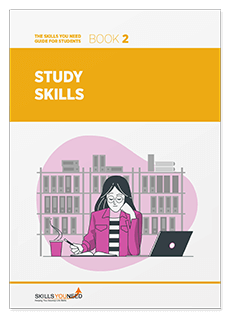The Skills You Need to Thrive
in a University Setting
See also: Top Tips for Studying
Thousands of students set off to their respective university campuses every year. They then spend several years working toward a qualification that may set them up for future success. Most students know how vital these schooling years are, especially when they can make or break the career you want to have.
However, that doesn’t mean all students will thrive in a university setting. If you’re worried about making the most of your years in tertiary education, it might be time to brush up on some of the following skills:

Research Skills
Research skills can be required from when you start thinking about tertiary education to when you put on your graduation cap and gown and walk out the school gates for the last time. Research skills help you learn as much as possible about the best universities, including their programs, opportunities, culture, and costs.
You can also use your research skills to maximize what you learn at university. Your chosen program will likely require you to find, evaluate, and analyze information from various sources to get your point across. Fortunately, not having research skills now doesn’t mean you never will. You may be able to refine them by:
Evaluating your information sources
Using advanced search techniques
Starting with broad topics
Seeking feedback from others
-
Using sound research sources, like university websites and library databases
Organizational Skills
Organization is one of the most critical skills you’ll need from day one of your tertiary education program. Being the master of organization means you’ll be adept at managing your everyday work schedule, helping you thrive in a fast-paced educational environment.
Organizational skills help you keep track of your assignments, study, and prepare for your exams while avoiding feelings of overwhelm. Organized people are typically great at using planners, calendars, apps, and other digital tools to manage their time, commitments, and obligations. When the time comes to apply to a university, start refining your organizational skills to prepare you for a university setting. You can do this by:
Keeping a tidy workspace
Grouping documents into folders
Keeping a calendar of deadlines
Writing timetables and schedules
Using tools and planners to help you remain organized
Writing Skills
While you likely won’t need to worry about your handwriting skills, writing skills can be vital once you start attending a tertiary education institute. Writing is essential for education providers to know you’re absorbing information and can communicate your ideas proficiently.
Throughout your university years, you’ll be required to produce countless reports, essays, and academic papers demonstrating your experience, expertise, and research skills. Unless your writing skills are excellent, there’s a chance you won’t excel in this area. Fortunately, writing skills can be learned. As a result, you can constantly be fine-tuning them as the years go by. Take note of these helpful tips:
Focus on grammar and spelling basics first
Always read what you write before submitting it
Proofread all content
Get feedback for improvements
Consider writing structure
Take a writing course
Self-Discipline
It’s sometimes not until you’re involved in everyday college life that you realize how easy it was to be in primary and secondary school. Your parents and teachers were there to encourage and motivate you. They even reminded you about deadlines and ensured you completed your work with time to spare.
That all changes once you’re by yourself in university. You have to rely on yourself and your own discipline and motivation to ensure your work is done. You also have to set goals, self-regulate, and maintain an appropriate work-life balance to prevent burnout. Self-discipline can be challenging for many people. However, not having the best self-discipline now doesn’t mean you’re doomed not to have it forever. You may be able to make some worthwhile changes by:
Writing down your goals
Prioritizing tasks
Understanding your weaknesses
Asking people to hold you accountable
Forgiving yourself when you don’t always get it right
Time Management Skills
University life is about more than managing your coursework. Many students find themselves having to balance their coursework with their social life and extracurricular activities. If they have a part-time job to cover some of their costs, they must also find time for this. Unless you have exceptional time management skills, it can be easy to get overwhelmed and experience burnout.
However, if you do have those skills, you can typically work out how to prioritize tasks, create schedules, and keep on top of your responsibilities. Everyday university life may then be much easier. If you know your time management skills aren’t as refined as they could be, take some of the following actions:
Break down big tasks into smaller chunks
Set goals
Set personal deadlines
Stick to your daily schedule
Know how you’re spending all your time
Tackle the hardest or most time-consuming tasks first
Collaboration Skills
University work isn’t all about tucking yourself away in your dorm room, studying by yourself for hours on end. There can be a great deal of teamwork involved, especially when tutors set collaborative projects and group assignments. You’ll need collaboration skills to perform your best work with other people.
Collaboration skills allow you to manage conflicts, practice active listening, compromise, and achieve shared goals. While you may not have the best collaboration skills now, you may soon refine them by:
Building your self-awareness so you know where you need to improve
Working on your emotional intelligence to identify your emotions and those of other people
Agreeing on shared goals or problems
Learning how to hold yourself accountable
Digital Literacy Skills
We have come a long way from chalkboards and handwritten notes. We now rely on apps, digital tools, and online platforms to learn new information and submit our university assignments. If you don’t have digital literacy skills when you attend university, you may find it challenging to complete the work assigned to you, perform research, and upload your assignments. Even accessing support services and university resources can be difficult. As a result, learning digital literacy skills should be your priority. You may improve these by:
Asking for help
Attending training courses or programs
Buying the required tech for your classes
Practicing often
Watching online tutorials
Further Reading from Skills You Need
The Skills You Need Guide for Students

Develop the skills you need to make the most of your time as a student.
Our eBooks are ideal for students at all stages of education, school, college and university. They are full of easy-to-follow practical information that will help you to learn more effectively and get better grades.
Thriving in a university setting is about more than being passionate about your course content. You must also have time management, communication, digital literacy skills, and organizational skills. The more of these skills you have, the easier it may be to excel in your chosen program.


